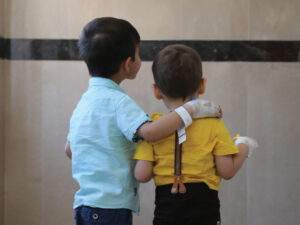MAHAK and Supporting Bereaved Families
- 5 April 23
- 1011 revirew
- 0 comment

MAHAK as a charity organization which is established with the mission of “supporting children during all phases of cancer treatment”, will certainly focus on the recovery of the patients. However, despite all efforts, in some cases we lose the patient. Therefore, psychological care is considered for the remaining person in standard treatment-oriented associations around the world, so that they can face this loss more easily.
MAHAK as a treatment-oriented institute that was established with the motive of providing treatment and support services for cancer-stricken children all over Iran, has also launched its “Bereavement Clinic” since 2019, which is the first bereavement clinic in the field of cancer in Iran. In this project, families who have lost their children due to cancer can receive individual counseling and “group therapy” under the supervision of a psychologist and social worker as needed.
Here is an article to take care of families who face a bereavement crisis for any reason, and we hope that with this content we have been able to take a step towards supporting bereaved families.
What is grief?
Grief is a phenomenon related to humankind. It is multidimensional and has pervasive effects on the bereaved person. The concept of grief usually refers to complex reactions that occur after experiencing separation and loss, especially after the loss and death of a loved one. Loss of communication, disability or loss of position can also be examples of grief. Therefore, all people usually experience the reaction of mourning and loss in their lives; but the process of dealing with it has different forms among different cultures.
What are the useful ways to cope with grief?
• Cope with stressful and sad situations:
Seeking help from reputable psychologists and performing techniques such as relaxation or meditation
• Making an appropriate relationship with a lost loved one
Finding an appropriate way of communication with the deceased person through remembering their memories, talking about the deceased and holding mourning rituals.
• Group and collective treatments
Communicating, talking and sharing feelings with those who have experienced similar bereavement.
• Family therapy
Communicating, talking and sharing feelings with family members
Finally, we hope that if you are experiencing “mourning”, this article has been useful for you and that we have been able to take a step towards the return of bereaved families to live.
